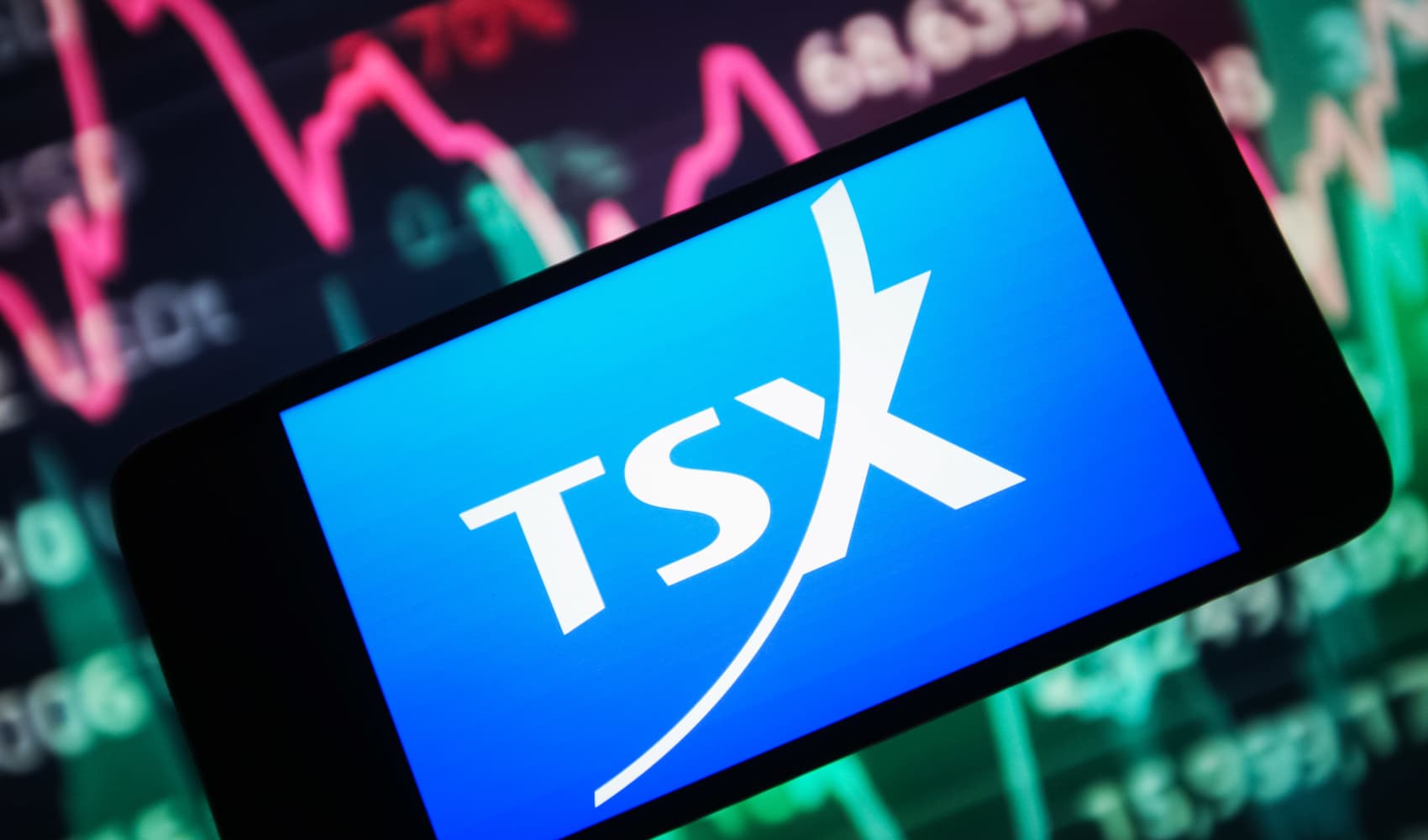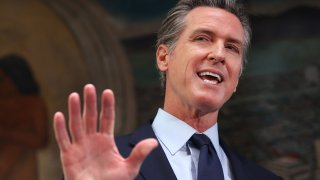
- Democrat Gavin Newsom will make history as the second California governor ever to face a recall election.
- Californians will decide whether to recall the Democratic governor in a special election on Sept. 14.
- "At this point, it would be shocking if the recall succeeded," said a GOP strategist.
SAN DIEGO, Calif. — The effort to throw California Gov. Gavin Newsom out of office has dominated political headlines in the Golden State for months.
Newsom's recall may come as a surprise, especially given his steady popularity in the blue state since he defeated his GOP opponent in 2018. However, due to a mixture of conservative grievances and pandemic outcomes, Newsom will make history as the second California governor ever to face a recall election.
Californians will decide whether to recall the Democratic governor in a special election on Sept. 14, California Lt. Gov. Eleni Kounalakis announced July 1.
Get top local stories in Southern California delivered to you every morning. Sign up for NBC LA's News Headlines newsletter.
This comes after the California secretary of state last month certified that the recall effort against Newsom collected enough verified signatures to initiate the special election, with more than 1.7 million people backing the measure, according to a press release.
Given how rare it is for California recalls to qualify for the ballot, here is everything you need to know about Newsom's recall, including why he is likely to keep his place in office.
Newsom likely to prevail
Money Report
Prior to Newsom, the first governor to face a recall election was then-Gov. Gray Davis, a Democrat, who lost to Republican Arnold Schwarzenegger in the 2003 recall election.
Unlike Davis, however, experts and recent polling indicate that Newsom will likely survive the recall and defeat the nearly 60 candidates running against him.
Newsom's most prominent rivals are Republicans, including former mayor of San Diego Kevin Faulconer and former U.S. Rep. John Cox of Sacramento. Caitlyn Jenner, a reality television star and former Olympic athlete, is also running, with the help of Donald Trump's former campaign manager, Brad Parscale.
"At this point, it would be shocking if the recall succeeded," said GOP consultant Rob Stutzman, who served as former Gov. Arnold Schwarzenegger's communications director.
"Covid has waned, the economy is resurging and there are far more Democrats than Republicans in this state that will vote in favor of him. I think Newsom should be in good shape," Stutzman said.
A poll conducted in early May by the Public Policy Institute of California, or PPIC, found that 57% of likely voters would support Newsom in the election while 40% would vote to recall him.
The poll also found that Newsom's job approval rating among likely voters is 54%, which is almost double Davis' approval rating in 2003, according to PPIC President Mark Baldassare.
To explain this data, Baldassare cites "two important indicators" of Newsom's standing that dramatically improved between January and May of this year. This includes Californians' perceptions about the U.S. economy and Covid, which are both data points recorded in the poll as well.
"These indicators have evidently improved in the last few months, putting Gov. Newsom in a relatively strong position as he faces a recall," Baldassare said.
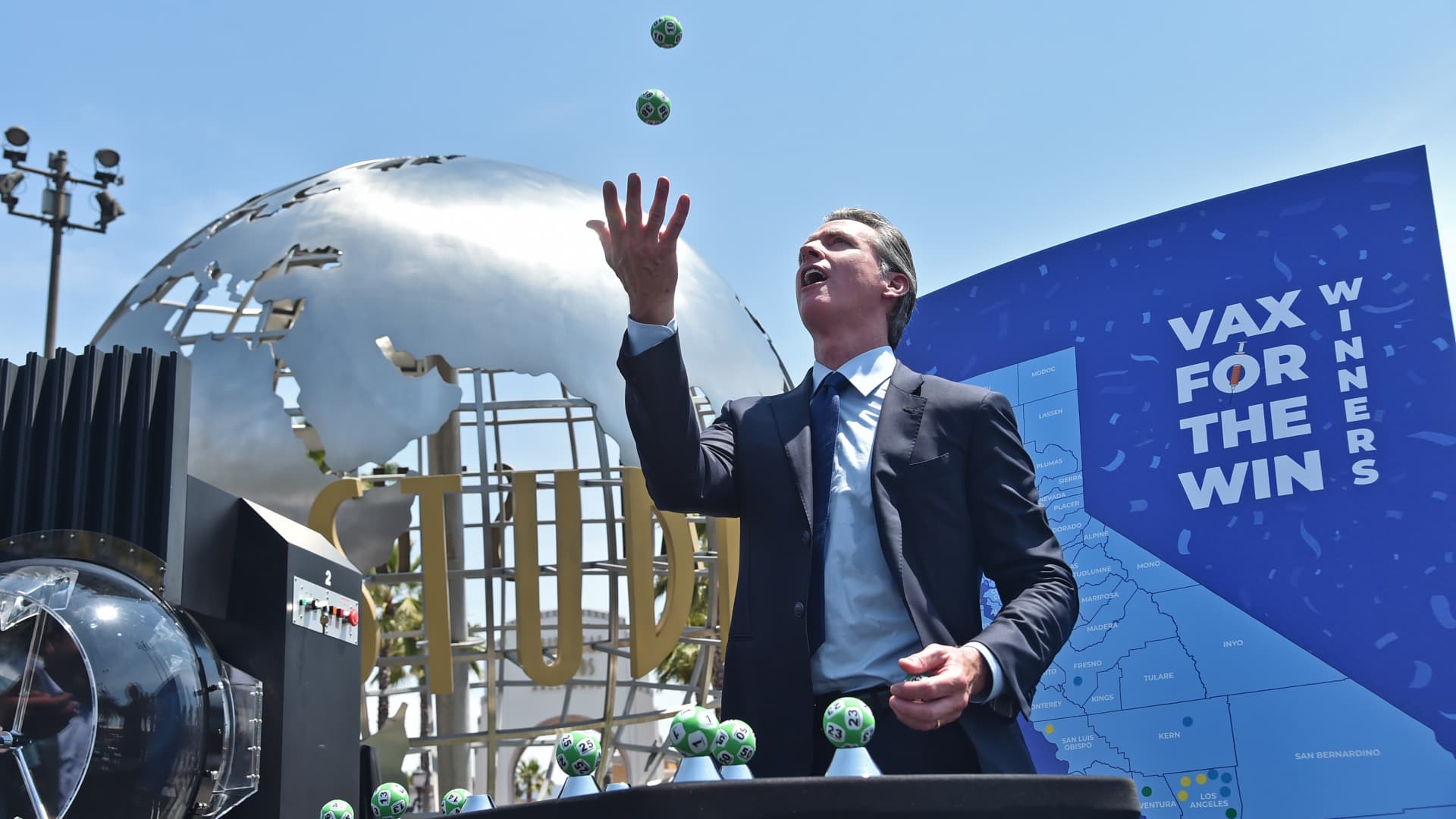
The poll found that 51% of likely voters expect that the U.S. economy will be in good condition in the next 12 months. Stutzman added that the condition of the California state economy will likely bring Newsom "high favorability" among voters.
He noted California's budget surplus this year and steady reopening after pandemic lockdowns, a stark contrast to 2003 when the state struggled with budget deficits and increased auto registration taxes under Davis.
As for Covid, the poll found that 90% of likely voters believe that the worst of the pandemic is over, and 70% believe that the state government is "doing an excellent or good job" with vaccine distribution.
Democratic consultant Michael Soneff also cited improved Covid conditions as a reason Newsom will likely survive the recall.
"Californians are getting vaccinated quickly, things are reopening and masks are receding — it's a terrible outcome for recall proponents and a good outcome for Newsom," Soneff said.
Dan Schnur, a politics professor at three California universities who previously led the California Fair Political Practices Commission, added that the newly announced Sept. 14 election date is expected to improve Newsom's chances.
Holding the election earlier than November, which is when regular gubernatorial elections are usually held, will allow Newsom to win over voters before another Covid outbreak or the peak of California wildfire season.
However, other factors could potentially influence voters, such as the recent drought in the state. Newsom declared a drought emergency in several California counties in late April. On Thursday, he urged Californians to reduce their water usage.
Roots of the recall
Californians initially approved of Newsom's response to the pandemic, especially after the state was the first in the nation to issue a stay-at-home order in March 2020.
However, the pandemic eventually became the reason the recall effort was able to gain traction last fall.
"The only thing that separates this recall effort from any of its predecessors is that this one gained its strength from Covid-19," Schnur said.
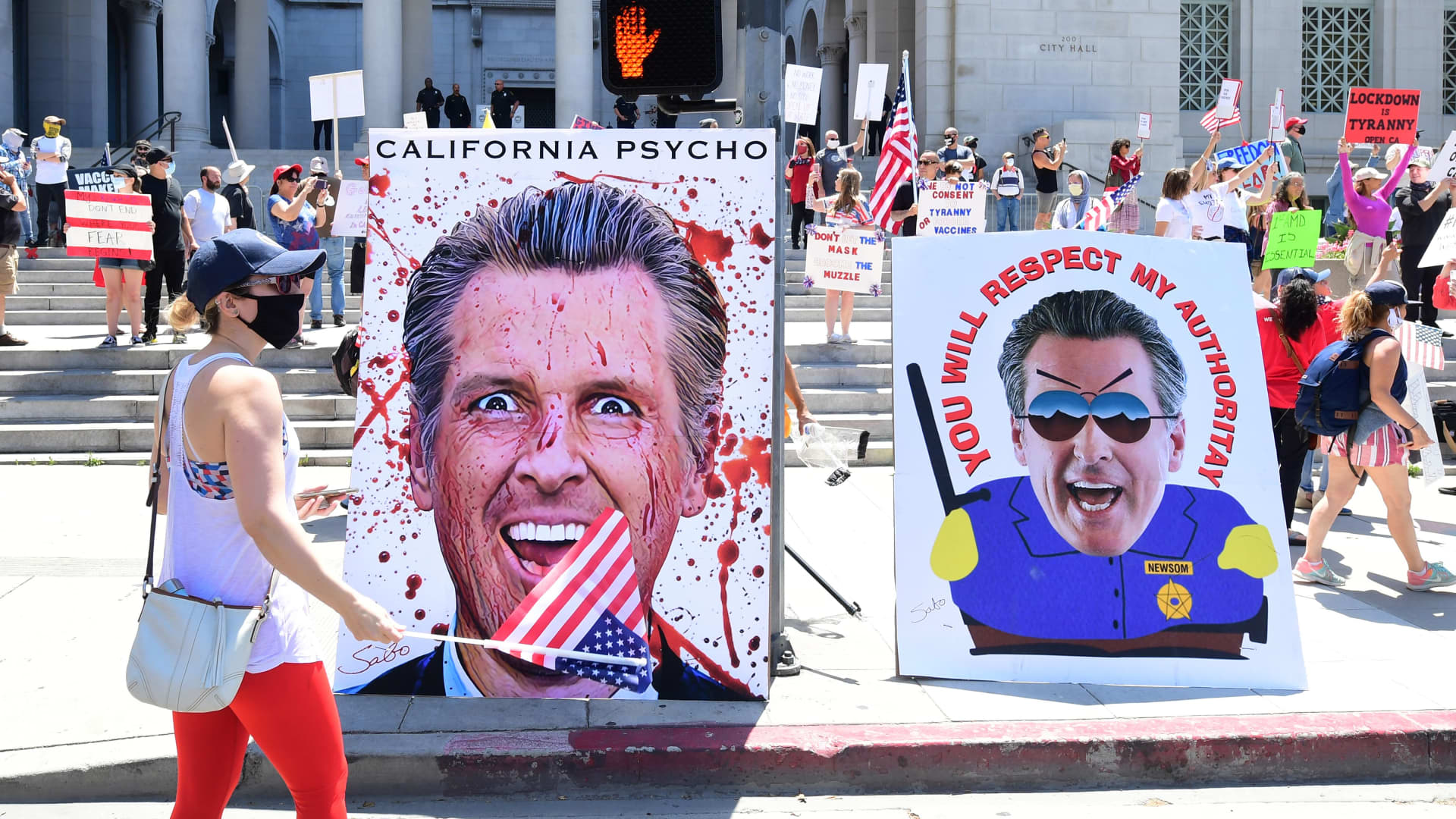
The recall effort was filed to the secretary of state in February 2020. It was initially focused on conservative grievances against Newsom that were unrelated to Covid, which would be declared a pandemic in March of that year. These included high taxation, homelessness, a moratorium on the death penalty, and "failing to enforce immigration laws," according to the petition filing.
After receiving approval from the secretary of state in June 2020, organizers of the effort had 160 days to collect petition signatures equal to 12% of the voter turnout in the last election for governor, or 1,495,709 signatures, in accordance with state recall laws.
But state health orders that closed nonessential businesses and enforced social distancing became a hurdle for collecting signatures, which led a Sacramento judge to approve a 120-day extension for the organizers in November.
The recall effort continued to struggle in collecting signatures until photos leaked of a maskless Newsom attending a dinner at a Napa Valley restaurant on Nov. 6, with people from several households. Californians were outraged, especially as Newsom's actions contradicted his own stay-at-home orders.
"It was just a startling hypocrisy by the governor that went national. It had a story, and so awareness of it was high," said Stutzman, the Republican consultant. "It was after that that it clearly helped fuel the effort to convince people to sign the petition."
The incident only added to growing frustrations over Newsom's health orders that shuttered schools, churches and businesses, which caused a massive outpouring of new supporters to the recall.
The petition went from having a mere 55,588 signatures on the day before the photos leaked to nearly half a million one month after Newsom's restaurant faux pas.
The number of signatures continued to climb over several months, reaching a total of 1,719,900 on June 23, 2021, when the secretary of state officially announced that the recall election would occur.
"The effort became driven by a resistance to public health and public safety," Soneff said. "It relied on the hostility — coming from mainly Republican voters — to public safety measures during Covid-19 to get those signatures."
People behind the recall
Five attempts to recall Newsom have failed to qualify for the ballot since he was inaugurated in January 2019. The sixth try is led by Orrin Heatlie, a Republican and retired Yolo County sheriff's sergeant, along with his group, the California Patriot Coalition.
Mike Netter, co-founder of the group, said supporters of the recall effort are a cross-section of Republicans, independents and Democrats.
"The effort is made up of Californians united under a specific cause to make for a better California," Netter said.
However, lists of endorsers and donors to the recall effort as well as the PPIC poll indicate that it is largely supported by committed Republicans.
Most notably, Newt Gingrich, the Republican former House speaker from Georgia, has promoted the recall effort, according to CalMatters. Mike Huckabee, the Republican former governor of Arkansas, has contributed $175,000 through his PAC to the approximately $4.9 million raised in donations to the effort.
While the recall effort was not initiated by the national or state GOP, the California Republican Party is also a major donor, having contributed $187,218, according to CalMatters.
The California Revival PAC, whose chair is the former chair of the California Republican Party, contributed $157,500, according to CalMatters.
Other major donors include venture capitalist Chamath Palihapitiya, who contributed $100,000 to the effort.
However, the money raised by supporters of the recall is dwarfed by that raised by opponents. Anti-recall contributions stand at $22.8 million as of July 7.
The PPIC poll found that views on the recall among likely California voters are strongly linked to partisanship. Seventy-eight percent of Republicans said they would vote to recall Newsom, which is far more than the 47% of independents and 11% of Democrats who said they would.
"There may be some Democrats and independents who support the recall effort, but the major area of support for the recall is definitely coming from Republicans," said Baldassare.
Newsom's response
Newsom avoided inquiries about the recall for months until he launched an official countercampaign in March called "Stop The Republican Recall."
Nathan Click, the senior advisor and communications director of Newsom's campaign, said it is largely focused on informing Californians about who is behind the recall effort.
"The eyes of the nation are on California, and we are telling Californians about what's at stake," Click said. "We are simply doing the math for them and showing them who these recall proponents are and what they're trying to accomplish."
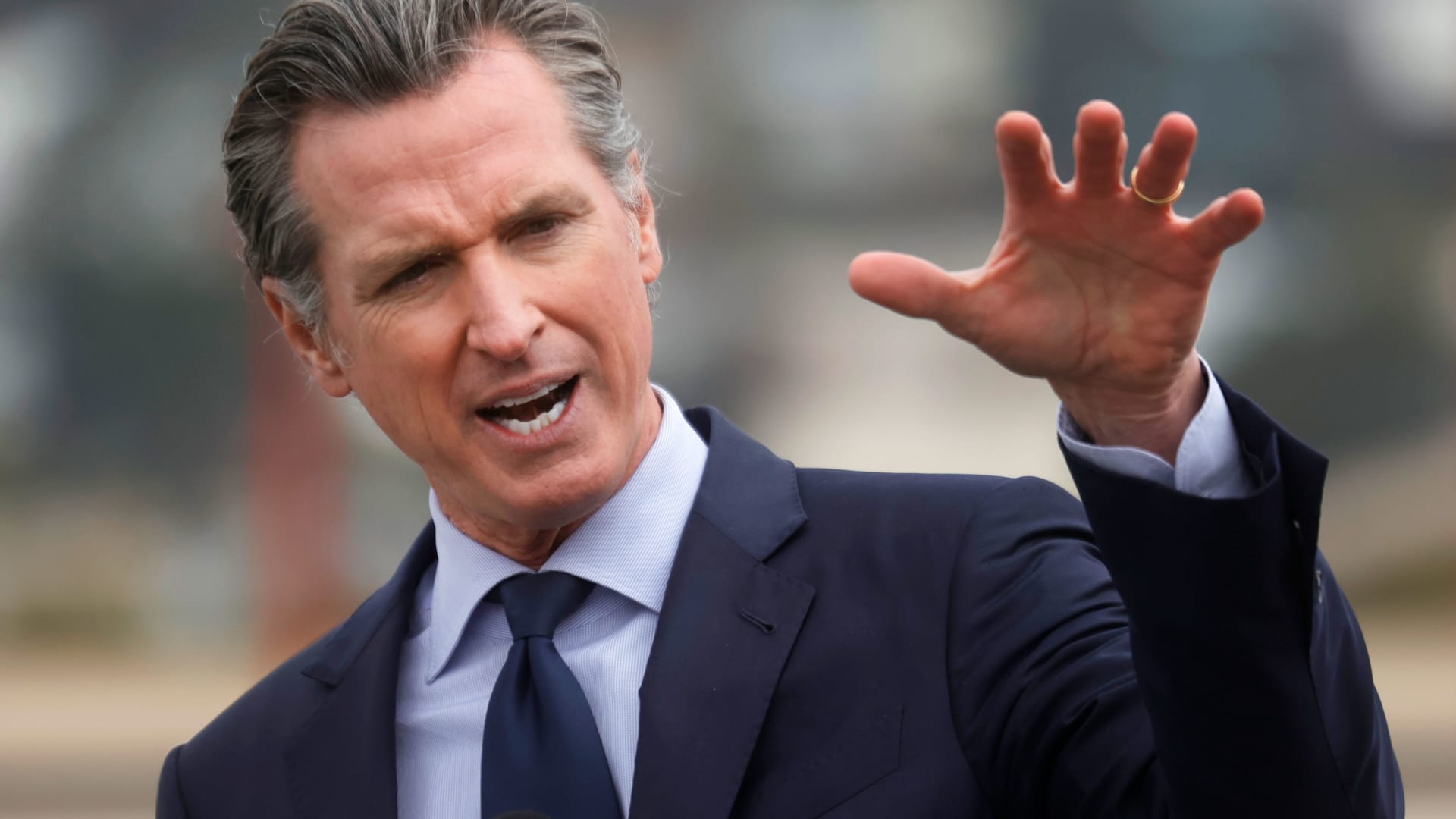
The campaign website characterizes the recall proponents as "a partisan Republican coalition of national Republicans, anti-vaxxers, QAnon conspiracy theorists and anti-immigrant Trump supporters." It also cites The Los Angeles Times, which reported in March that some far-right extremists were involved in collecting signatures for the recall effort.
Click said Newsom's campaign currently has over 300,000 donors from all 50 states.
This includes the California Democratic Party, which contributed $1,358,589, according to CalMatters. Most notably, the campaign received a $3 million donation from the founder of Netflix, Reed Hastings.
Click added that Newsom's focus is on more than just the upcoming recall election.
Newsom is negotiating with the legislature about his "California Comeback Plan," the largest state economic recovery package in history. It aims to tackle issues such as homelessness, wildfires, job creation and climate change, according to Click.
"Regardless of this recall, Newsom's focus has been fighting the pandemic," Click said. "As we head out of the pandemic, he is working towards building an economic recovery that lifts every Californian."


